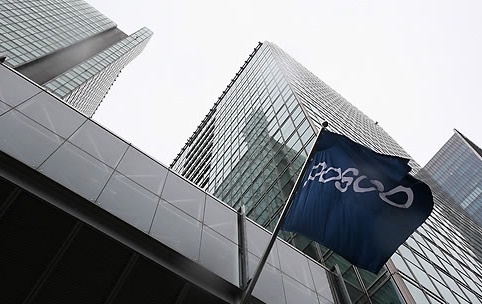Pos-HiaL, an alumina supplier in which POSCO has a 51 percent stake, filed for court receivership last week, company officials said.
It is the first time in the steelmaker’s 47-year history that one of its affiliates has been put under court supervision.
Pos-HiaL was established in 2012 as a joint venture between POSCO M-Tech, POSCO’s raw materials arm, and alumina manufacturer KC Corporation. The company, however, has faced continued losses due to low demand and oversupply in the LED market.
According to the company, Pos-HiaL has been suffering from capital impairment, seeing a 15.4 billion won ($14.2 million) loss from its 20 billion won capital base.
It is the first time in the steelmaker’s 47-year history that one of its affiliates has been put under court supervision.
Pos-HiaL was established in 2012 as a joint venture between POSCO M-Tech, POSCO’s raw materials arm, and alumina manufacturer KC Corporation. The company, however, has faced continued losses due to low demand and oversupply in the LED market.
According to the company, Pos-HiaL has been suffering from capital impairment, seeing a 15.4 billion won ($14.2 million) loss from its 20 billion won capital base.

Last year, the company recorded 1.44 billion won in sales while its operating loss logged 6.75 billion won. The firm’s net loss during the period was 11.8 billion won.
An official from the company said POSCO would decide whether to go through a workout program or liquidation depending on the court’s decision.
“Liquidation is one of the many options being considered. But nothing has been decided yet,” the official said.
The consensus among market insiders, however, is that the alumina and LED manufacturer will be liquidated due to prolonged losses.
POSCO has been pushing for drastic restructuring to revamp its business portfolio and boost its fiscal soundness.
The company went through 11 restructuring processes last year, but it has been under pressure to take stronger adjustments.
Market watchers say that for POSCO, which is already being scrutinized for alleged corruption, liquidating the subsidiary in a show of taking stronger restructuring steps may be too great to pass.
The prosecution has been expanding its investigation into POSCO’s embezzlement in overseas business projects under the helm of former chairman Chung Joon-yang. Prosecutors believe the company created a slush fund while implementing engineering projects in Vietnam.
Another speculation behind the expected liquidation is that choosing to keep the subsidiary alive could result in a repeat of the controversy surrounding POSCO Plantec.
Since 2010, POSCO has injected 290 billion won into POSCO Plantec, in an attempt to keep the plant-building arm afloat.
However, POSCO Plantec’s deficits have only grown, attracting criticism.
By Suk Gee-hyun (monicasuk@heraldcorp.com)





![[From the Scene] Monks, Buddhists hail return of remains of Buddhas](http://res.heraldm.com/phpwas/restmb_idxmake.php?idx=644&simg=/content/image/2024/04/19/20240419050617_0.jpg&u=20240419175937)





![[Graphic News] French bulldog most popular breed in US, Maltese most popular in Korea](http://res.heraldm.com/phpwas/restmb_idxmake.php?idx=644&simg=/content/image/2024/04/18/20240418050864_0.gif&u=)


![[From the Scene] Monks, Buddhists hail return of remains of Buddhas](http://res.heraldm.com/phpwas/restmb_idxmake.php?idx=652&simg=/content/image/2024/04/19/20240419050617_0.jpg&u=20240419175937)

![[KH Explains] Hyundai's full hybrid edge to pay off amid slow transition to pure EVs](http://res.heraldm.com/phpwas/restmb_idxmake.php?idx=652&simg=/content/image/2024/04/18/20240418050645_0.jpg&u=20240419100350)

![[Today’s K-pop] Illit drops debut single remix](http://res.heraldm.com/phpwas/restmb_idxmake.php?idx=642&simg=/content/image/2024/04/19/20240419050612_0.jpg&u=)